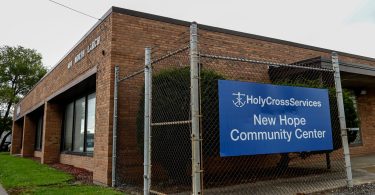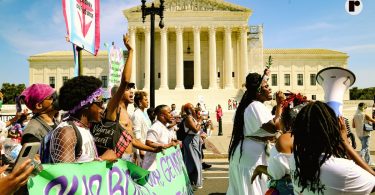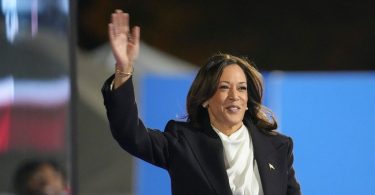Former Houston Mayor Annise Parker, president and CEO of the LGBTQ+ Victory Fund and LGBTQ+ Victory Institute (Washington Blade photo by Michael Key)
The Washington Blade connected with former Houston Mayor Annise Parker last week, shortly after breaking the news of her departure from the LGBTQ Victory Fund and LGBTQ Victory Institute after six years of serving as president and CEO.
The organizations are, respectively, dedicated to increasing the number of public officeholders who are LGBTQ+ and providing training and resources for them, whether they are appointed or elected to the positions they hold.
Parker’s exit was planned since last July, in coordination with the boards of directors. “We worked out the timing together,” she said. “I wanted 2024 to be my last year, but I also think we all recognize the importance of this election and what’s going on politically,” and for these reasons “I wanted to [leave] in the least disruptive way possible.”
This means staying on through the end of this year, in part to assist the boards in “a thoughtful search process” for her successor.
Parker told the Blade she agreed to take the helm at Victory at a time when the organization had strong foundations but “lost its way a little bit” by straying from its “really narrow mission,” which is “to put LGBT leaders into public office.”
“In my view, one of the most important things I did was bring us back to where we started,” she said. “We’re the only national organization that only works with LGBT leaders. We love our allies and we respect our allies, but they are not our mission.”
So far this year, conservative lawmakers have proposed more than 400 bills targeting the rights of LGBTQ+ Americans. The moral panic stoked by the right wing against queer and especially trans people brings into sharp relief the importance of the work in which Victory is engaged, Parker said.
“Because of these ever growing attacks on our community, the need for LGBT leaders who are willing to step up and serve and run for office has never been greater,” she said. When Victory was founded “33 years ago, there were just a handful of folks; most of our community was in the closet.”
Parker remembers, “I ran for the first time in 1991, the year Victory was founded. It was a long time ago. We were pioneers. But now we are the strongest line of defense. And the barbarians are at the gate.”
Then, as now, coming out “in all aspects of our lives” is “the most powerful thing we do,” Parker said — a lesson she first learned as an activist in the 1970s. “It still matters,” she said. Candidates backed by Victory are often voters’ first exposure to gay, lesbian, bisexual, trans, or genderqueer people, she noted — “and it changes hearts and minds.”
Many begin their careers in public service at school boards or other local offices, but go on to serve in progressively higher-profile roles, Parker said. She pointed to Colorado Gov. Jared Polis, who is gay, and served as a statewide education official before his election to the U.S. Congress and then the governorship.
The importance of local races must not be overlooked, Parker stressed. To take the example of school boards, she said, “folks on the other side” like the anti-LGBTQ+ extremist group Moms for Liberty are “targeting school boards for the same reasons that Victory works in school boards.” So, “we need to be where our enemies are.”
Opponents of LGBTQ+ rights “see what’s happening demographically, in terms of changing attitudes, about all sorts of things — including the LGBT community,” and while “we have won this war,” generationally speaking with increased acceptance, Parker warned that “we can still lose a whole lot of battles.”
“These overt attacks, you know, they didn’t have to attack us 30 years ago in the same way, because we had no protections,” Parker said. “This is part of the backlash for all of the successes that we’ve had.”
An example of that success: “There is no place in America,” she said, “that is not accessible to the right LGBT candidates with the right mix of ideas and energy and insights for that district to win.”
Parker added, “And part of the reason that we push so hard for our trans candidates that we work with, is that they’re the tip of the spear right now. They’re the ones that are the target of the attacks.”
At the same time, she is clear-eyed about the threat presented by the presumptive Republican nominee for president.
“What keeps me awake is the idea that Donald Trump could again become the president of the United States,” Parker said. “That is horrifying. And I would I would willingly lose every other race to keep him away from — I mean, I just perceive him as an existential threat to democracy in America.”
Here, again, part of the bulwark against this threat will be “our candidates,” who are “mobilizing people who will be in direct opposition to the horrific vision of America that he’s pushing,” Parker said. “I absolutely believe there’s a fundamental difference between the two presidential candidates that we’re going to have. And I also believe that it’s critical for democracy not to have Donald Trump.”
The Victory Fund endorses LGBTQ+ candidates who are positioned to win and who also believe in bodily autonomy; the right to privacy that undergirds not only protections for LGBTQ people but also reproductive freedoms.
“When we were founded,” Parker said, the attacks on body autonomy were happening on multiple fronts, from restrictions on access to abortion to sodomy statutes that criminalized gay sex acts between consenting adults.
“All these trans issues we’re facing right now are about bodily autonomy,” she said. “We can have a legitimate argument about gender affirming care for people under 18 or even under 21, but for adults, it is about body autonomy.”
Likewise, under the right to privacy rubric, “more and more places are rethinking how we deal with those who abuse substances,” she said, adding that anyone who is LGBT has to care about a right to privacy that incorporates body autonomy.
Parker explained that “Over the years, there have been a lot of men that I’ve talked to who asked the same question, ‘Well, why do you have to be pro choice?’ Our candidates don’t have to believe in or want to support abortion, but they must believe that every human being has the right to body autonomy, because they demand it for themselves.”
As a result, and because of the Republican Party’s hostility toward reproductive freedom and the rights of trans people, Parker said “it is really challenging to find Republican candidates” who qualify under the criteria for Victory Fund as an endorsing PAC.
Most conservative candidates who object to the criteria about abortion “also have problems with the fact that we are fully supportive of the trans community,” she said.
Asked about plans for Victory following her departure, Parker said there are concrete goals and metrics that were established in the organizations’ five-year strategic plan, among them, building a roster of “LGBT candidates who are ready for the presidential stage.”
The Victory Fund endorsed former South Bend, Ind., mayor and current U.S. Secretary of Transportation Pete Buttigieg’s presidential run in 2020 — but even though he was the only LGBTQ+ candidate, the endorsement was hardly a foregone conclusion.
“I am a huge Pete Buttigieg fan,” Parker said. “I think he’s got mad political skills,” but at the same time, she hedged, “when you think of presidential candidates, you think of governors” or folks who are well known on the national stage, often with many years of service in public office.
“From the first notice to his first announcement, we waited six months because — and I had the conversation with him — you have to poll consistently; you have to be competitive financially; and show you can place in these primaries,” Parker said. “And he did.”
The Transportation Secretary has “superb political instincts,” she said. “He is brilliant. He has the ability to connect to people. And he thinks really strategically.”
Also in Victory’s roster of potential presidential candidates are “three governors and a former governor, Kate Brown” along with “other statewide elected officials — so we have two attorneys general, two United States senators,” and “big city mayors; I’m a former big city mayor,” and then “you have [San Diego Mayor] Todd Gloria and [former Chicago Mayor] Lori Lightfoot.”
The National LGBT Media Association represents 13 legacy publications in major markets across the country with a collective readership of more than 400K in print and more than 1 million + online. Learn more here: NationalLGBTMediaassociation.com.







